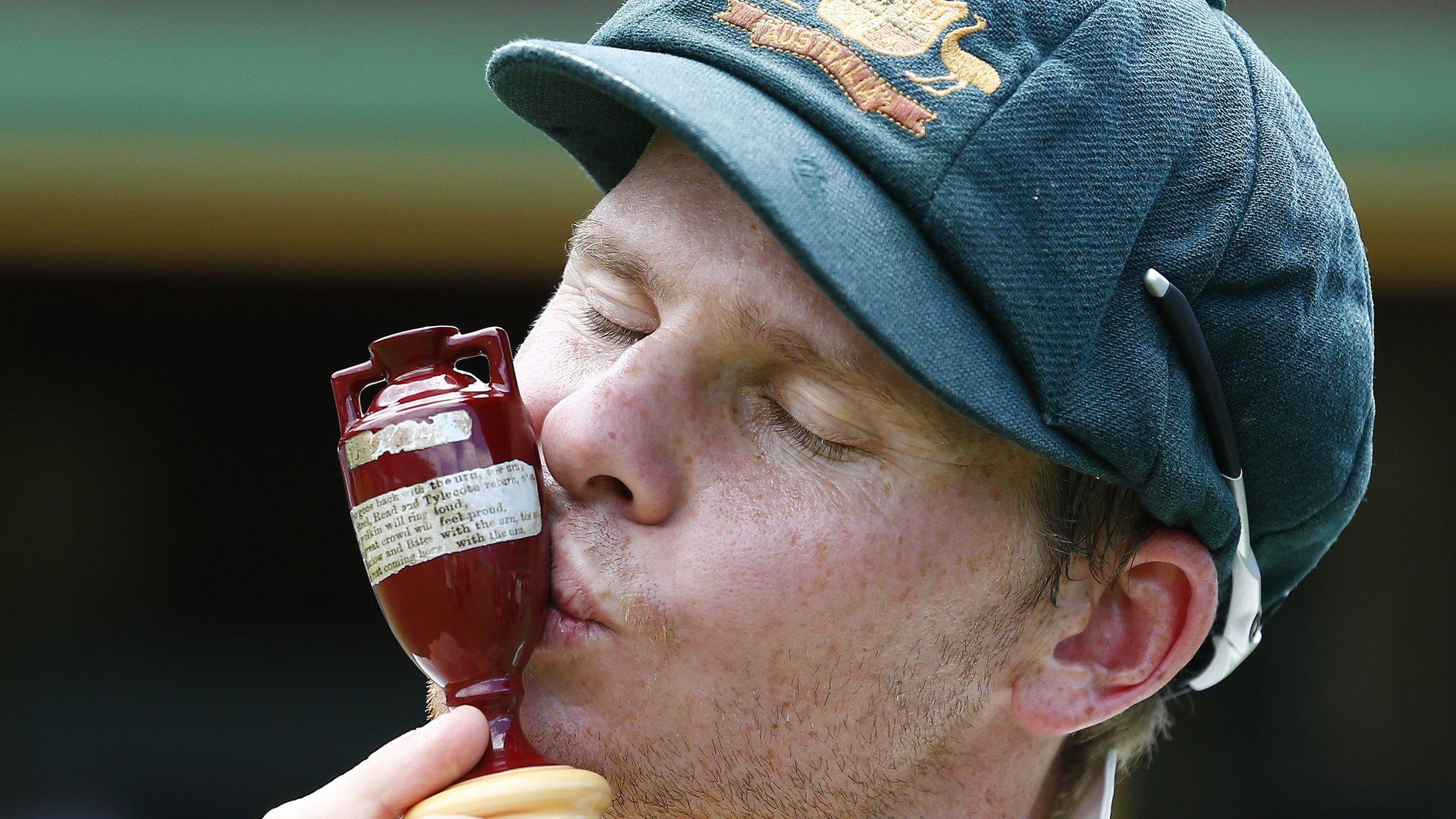Ashes: The perils of touring Australia as an England player
- Published
- comments
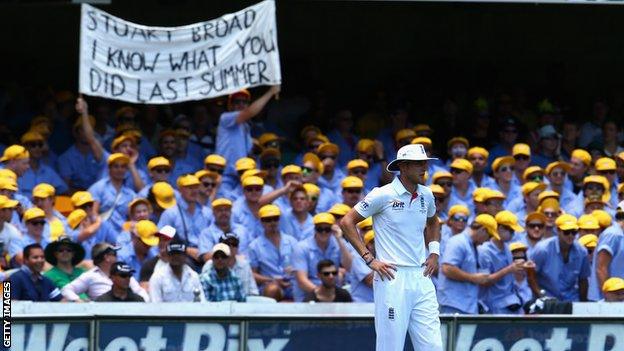
Stuart Broad, one of many England players to receive a warm welcome from the Australian public
This article contains language which some people may find offensive.
Feral. Loud. Relentless. And that's just Brisbane.
Historically, England's cricketers have never had an easy time when they've pitched up in Australia. Everything - and everybody - is against them.
England have won in Australia, but only four times since 1954-55.
They have lost horribly there, too. Teams have fallen apart, careers have been ended and players barracked from the streets to the newspaper stands.
So what are the pressures of an Ashes tour - and how do players cope?
'We even got sledged by the captain of the aeroplane' - the public
Australia is a tough place to tour, from the moment you land in the country. Quite literally.
Former England spinner Phil Tufnell, who played in two losing Ashes tours, remembers the customs officers "having a go soon as you stepped foot on the tarmac. We might have even got sledged by the captain of the aeroplane as we left."
With the Ashes at stake, the attention and pressure on players is multiplied. Anonymity can be difficult.
England wicketkeeper Jonny Bairstow recalls: "Gary Ballance and I had flown over to go and play for the Lions team and we were just minding our own business, getting out of the car.
"These builders saw us and just started laying into us - a barrage coming our way about me being ginger. 'Have you got your sun cream on? All that sort of stuff. Geez, it was character building."
On the 1998-99 tour, England batsman John Crawley was making his way back to the team hotel in Cairns when he was punched by a drunken stranger., external
A shaken-up Crawley, who suffered cuts and bruises, managed 86 runs at an average of 14 in three Tests.
Although these incidents are rare, players can expect quips - humorous or otherwise - from passers-by.
"On the way home after day one in Brisbane, a guy pulled up next to our minibus," says former England spinner Graeme Swann.
"He was on a Harley Davidson, in Brisbane Broncos shorts and a vest, with a can of Castlemaine XXXX in his hand. He pulled up, went 'Ha, you blokes stuffed up' and rode off. It was marvellous."
Pigs, idiots and cauldrons - the crowds

'Botham' the pig wanders around the boundary during an ODI in Brisbane in 1983
The noise from the crowd rattles off the concrete stands at the Gabba. It is nicknamed the Gabbatoir by touring sides. Pigs have been smuggled into the stadium more than once., external
It is a fortress for Australia - of the 59 Tests played on the ground, they have won 37 and lost only eight. England have not claimed an Ashes victory there since 1986.
"Brisbane is a cauldron. It is the least genteel crowd I've ever known. It's feral. It's loud," says Swann.
"They put the signs up saying no sledging can be on the basis of race, gender or sexual orientation. And then pretty much everything that gets said to you is based on all three."
This is the venue where England will begin their Ashes defence on 23 November.
They must also contend with 90,000 people at the MCG in Melbourne, home of the notorious Bay 13 and a ground so unruly that extra police were once employed and Australia captain Ricky Ponting pleaded with fans to behave., external
Former South Africa captain Graeme Smith, whose side lost 2-0 in Australia in 2008, says: "Playing in England is quite festive. In Australia it's just relentless.
"What is different is the noise levels and the biased nature of the crowd. People go at you all day, every day. They're very pro their own country and abrasive."
Tufnell once had a beef and onion pie slapped on his head and was also subject to one of the most famous crowd sledges in Ashes history when a spectator in Melbourne shouted: "Oi, Tufnell. Lend us your brain. We're building an idiot."
Occasionally things get physical. England's John Snow was manhandled by a spectator after hitting Terry Jenner on the head with a bouncer at Sydney in 1970-71, and captain Ray Illingworth took his players off the pitch until order was restored in the crowd.
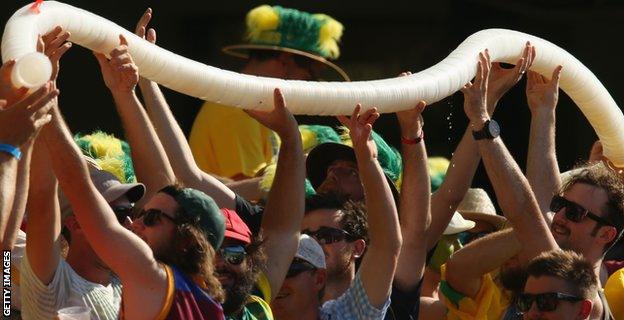
England lost their most recent Test at the Gabba by 381 runs, after being bowled out for 136 and 179
Australia don't always have it their own way, though.
Out-of-form pace bowler Mitchell Johnson spent the latter half of the 2010-11 Ashes series with the Barmy Army's song ringing in his ears, with one England player, external even egging the fans on.
"When it is going England's way, I always liken it to the crowd in Rocky IV," says Swann, who was part of the England side that won 3-1 in 2010-11.
"The Australia fans soon change their allegiances. They like winners. They can't deal with being on the losing side. We found by the end in that series, they just turned on their team."
'Do you like hospital food?' - the sledging

James Anderson and Michael Clarke exchange words during the 2013-14 Ashes series
The Ashes and sledging go hand in hand. There are plenty of books, T-shirts and posters bedecked with sledges, some real, some apocryphal. Daft comments are all the rage around an Ashes series.
David Warner got us off to a flying start this year. Describing the five-Test series as a "war", the Australia opener said: "I try and look in the opposition's eyes and try and work out, 'How can I dislike this player. How can I get on top of him?'
"You have to delve and dig deep into yourself to actually get some hatred about them to actually get up when you're out there."
Fast bowler Craig McDermott, after being dismissed by Tufnell, allegedly asked if hospital food suited him. There are almost enough sledges from Merv Hughes, external to fill a book. Steve Waugh's Australia teams specialised in "mental disintegration"., external
Even the umpires get involved. When Tufnell asked how many deliveries remained in an over, Peter McConnell is reported to have said: "Count them yourself, you pommie bastard.'"
After England were beaten in Adelaide in 2006-07, the teams convened in the Australian dressing room for a post-game beer. England's James Anderson, egged on by Australia batsman Damien Martyn, threw a pad at Michael Clarke., external
Seven years later, Anderson and Clarke squared up during the Brisbane Test. Australia captain Clarke told Anderson to expect a broken arm while he was batting. He was fined 20% of his match fee for using an obscenity in doing so.
However, by the end of the series - albeit after Australia had won 5-0 - Clarke and Anderson shared a beer, external in Sydney.
'Smug Pommy cheat' - the press
The Australian press is no more welcoming, as England's Stuart Broad knows only too well.
During the 2013 Ashes in England, Broad refused to walk despite edging to slip via wicketkeeper Brad Haddin's gloves.
Australia were apoplectic. Coach Darren Lehmann called Broad a "blatant cheat" and urged the fans to "make him cry" when England toured Australia later that year.
The press did their bit. Some newspapers refused to use pace bowler Broad's name throughout the 2013-14 series, instead calling him "the 27-year-old medium-pacer". The Brisbane Courier Mail would not use his photo, replacing it with a ghostly outline.
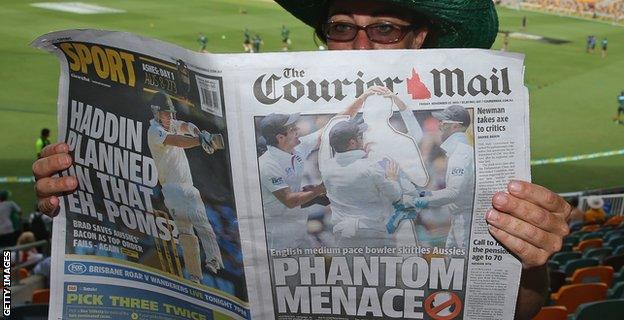
Stuart Broad was welcomed to Brisbane in 2013 by the local paper labelling him as a "smug Pommy cheat"
Broad had spoken with a psychiatrist before the tour. He knew he would get some jibes, but even he wasn't expecting what came his way.
"You feel your heart going because someone's calling you a bad name. But it turned from a few guys shouting at me to something else," he said., external
This year, England have been welcomed to Australia as the great unknowns.
When the squad arrived in Perth in October, Alastair Cook - a man who has played 147 Tests and is on his fourth Ashes tour - was mistaken for Ashes newcomer James Vince, external by a TV reporter.
Joe Root, England captain and widely acknowledged as one of the best batsmen in the world, was greeted by the headline "Average Joe" in the local newspaper during England's opening warm-up game.
Glenn McGrath's 5-0 predictions arrive without fail before every Ashes series, and England's batting line-up has already been described as one of their "worst ever".
The English press is not usually known for its optimism, either.
"There are only three things wrong with the English team - they can't bat, they can't bowl and they can't field," was journalist Martin Johnson's memorable line before the 1986-87 tour. England won the series 2-1.
When England lost in Australia in 2013-14, a Perth newspaper recreated the famous "in affectionate remembrance of English cricket" 1882 obituary by the Sporting Times from which the Ashes was born.
The jingoism doesn't always surface, though. When England racked up 517-1 in Brisbane in 2010, Australia captain Ricky Ponting was described as "clueless" by the Courier Mail, with one journalist criticising Australia's "sad-sack effort" in the field.
Broad took the mockery in his stride. He claimed 6-81 in the first innings at the Gabba and strolled into the news conference with a copy of the newspaper tucked under his arm.
It turns out the Australian press can be motivating as well as intimidating.
Sticking together - the team-mates
An Ashes tour often lasts three months. Away from family and friends, seeing the same people for the majority of the tour, can be draining.
The pressure of touring Australia has accounted for many a player and coach.
Andrew Flintoff, England skipper for the 5-0 whitewash in 2006-07, recalls: "I was having a drink with my dad on Christmas Eve and as we made our way home I started crying my eyes out. I told him I'd tried my best but that I couldn't do it any more." Flintoff never captained England again.
Half of England's 1994-95 touring squad were nursing injuries at some point. Even the physio broke a finger during fielding practice.
England's implosion on the 2013-14 tour was nothing short of spectacular. Jonathan Trott returned home early with a stress-related illness, Cook having seen tears in Trott's eyes as they went out to bat in Brisbane.
Swann retired mid-series, Kevin Pietersen never played again and team director Andy Flower quit after the tour.
Swann describes the team meeting after Adelaide, where England lost by 218 runs, as the worst he was involved in. It became "a finger-pointing session", he says, with batsmen blaming bowlers and vice-versa. "The wheels had fallen off."
Before England were successful in 2010-11, the players took part in a boot camp, external in a German forest. This was less popular when it was repeated three years later but, at the time, the players said it helped them become closer.
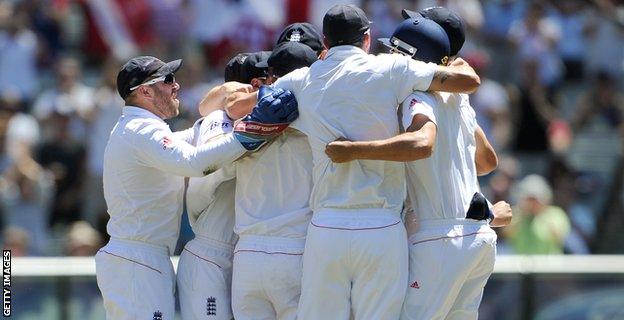
England's victory in 2010-11 was the first time they won the Ashes in Australia since 1986-87
On that tour, players' wives and girlfriends were taken for a pre-tour dinner with Flower and captain Andrew Strauss, where it was explained how they would be taken care of and how they could help the team win.
The closeness showed on the pitch. "Steven Finn was bowling - he was a 21-year-old at the time - and every time he walked back to his mark, Brad Haddin was giving him some stick," remembers Anderson.
"No-one was aware of it. We came in at tea and Finn said, 'It's getting to me'. So the minute we went out there after tea, all 11 players went straight at Haddin - 'you're picking on the young guy, why are you doing this?' He was really taken aback and he soon shut up.
"That sort of unity really goes a long way in Australia. If things aren't going well, you need to rally round each other and try and pick each other up."
Smith says South Africa "created spaces after a day's play where players could vent and joke and tell stories to ease some of the tensions and share the load with team-mates".
Swann adds: "What you need is someone who is as good a tourist as Steve Harmison, who once didn't take his blue one-day pads on tour so he could fit more cash-and-carry sweets in.
"His room used to be called The Harmison Arms. He used to have a dart board up, fill the bath with ice and get 50 beers and put them in for the end of play. You'd help yourself to sweets and play darts."
So there you have it. Sweets, darts and a thick skin - three key components to surviving an Ashes tour. If only it was that simple.
- Published21 November 2017
- Published21 November 2017
- Published21 November 2017
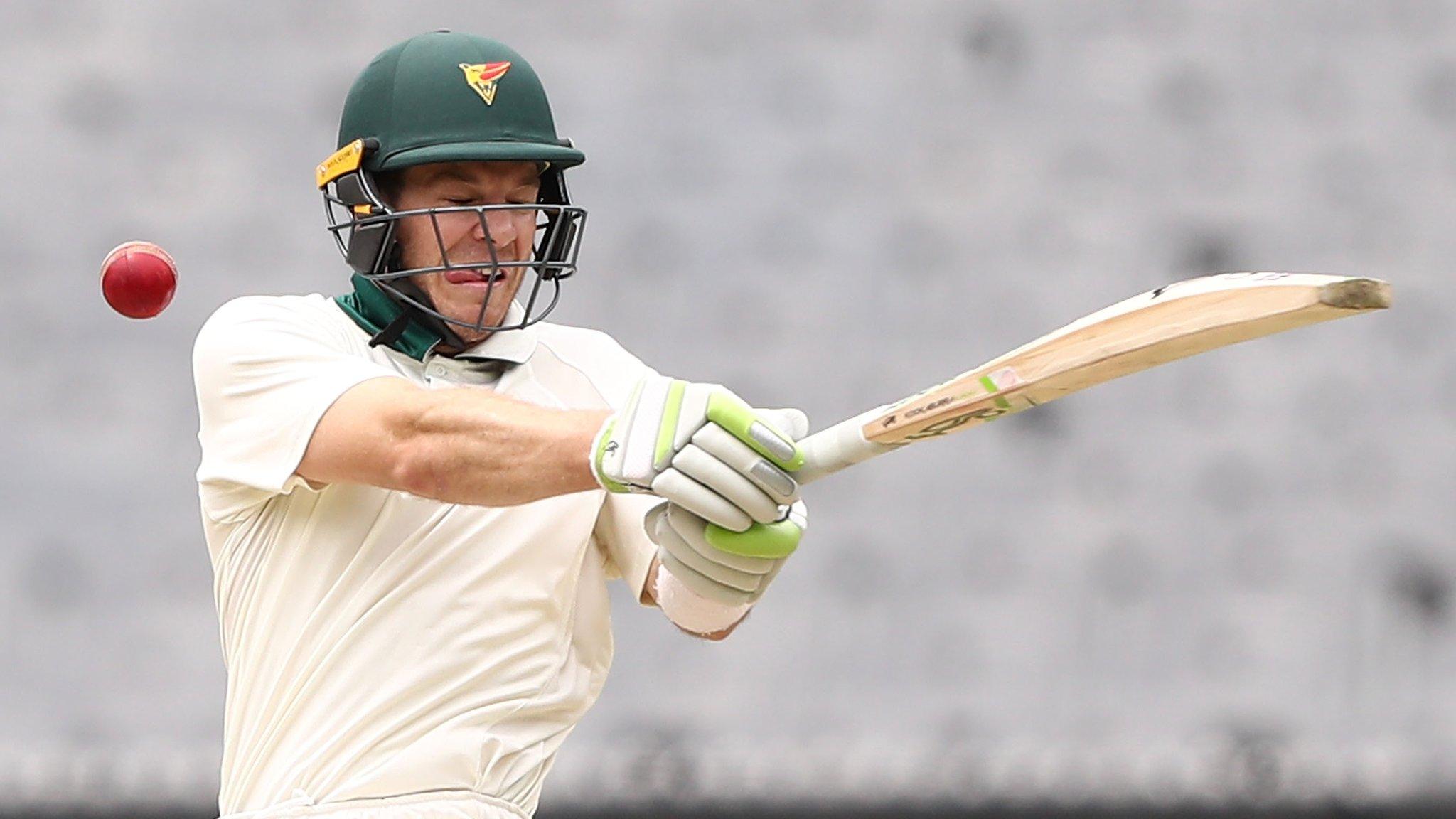
- Published9 January 2018

- Published12 January 2018
